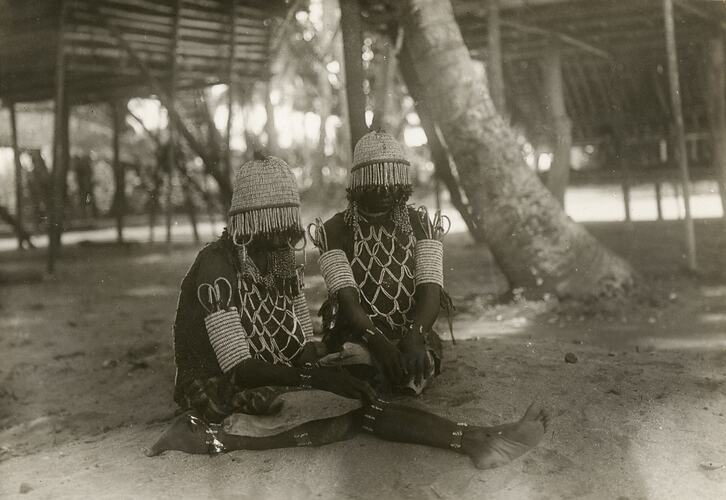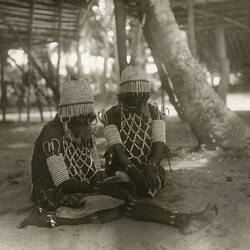Summary
Black and white photograph depicting two women mourning the loss of their husband from Uiaku Village, Collingwood Bay in mainland Papua New Guinea circa 1916.
The grieving garments worn by the women in this photograph were made during a period of seclusion which lasted up to several months. These finely made items were only worn once the seclusion period was over and the widow/s or pamone doru (female living partner/s of the deceased in Orokaivan language) were publicly visible to the village community. The grieving garments communicated to people that the widows were still in a state of mourning but allowed privacy due to the veiling of their faces by the strands of Jobs Tears seeds.
At the time this photograph was taken, it was common for a man from cultural groups residing in the Oro Province to take more than one wife. If a woman was made invalid by illness or injury, it was acceptable for the man to acquire another wife for practical reasons; to support the role that the first wife cannot fulfil, e.g. childbirth, physical labour, manual cooking. Cultural groups from Oro Province are largely patriarchal and it was important to honour and grieve the loss of a woman's husband.
Local Name
Pamone Doru (Female living partner of the deceased - Orokaivan langauge)
Physical Description
Sepia toned photograph of two seated women in a sheltered outdoor setting. Handwritten annotations on reverse.
More Information
-
Object/Medium
Photograph
-
Photographer
-
Locality
Uiaku Village, Collingwood Bay, Oro Province, Papua New Guinea
-
Date Produced
-
Collector
-
Date Collected
-
Image Dimensions - Photograph
102 mm (Length), 146 mm (Width)
Orientation: landscape
-
Keywords
-
Collection Names
-
Type of item
-
Discipline
-
Category
-
Collecting Areas

